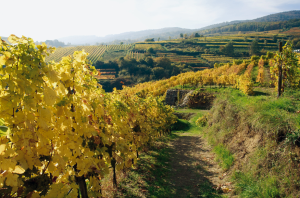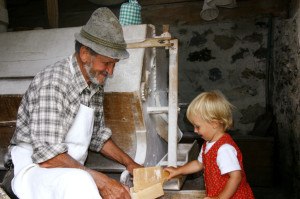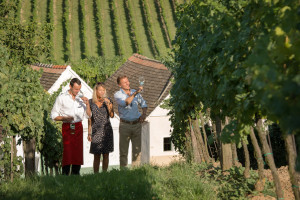ORGANIC AUSTRIA
ORGANIC AUSTRIA
With 13% of cultivated land and 10% of its farmers organic, Austria is an organic champion.
More and more people want to know where their food comes from and what’s in it. They are buying from local shops and organic producers. The advantages of organic produce speak for themselves. Consumers can enjoy healthier and tastier meals; farmers improve their business and earnings, not to mention seed varieties and forgotten breeds of animals that are restored. Monocultures make room for a colourful and lively diversity.
What may seem as if it had always existed is the product of a long process of a change in thinking. Organic food has always had a certain select following, but it is now embraced in the upscale urban neighbourhoods of cities from New York to Vienna. ‘Bio’ is now much more than a fad: it is a permanent fixture of the future. It is not surprising that the large supermarket chains are turning an ever-growing profit with their organic selections, and Austria ranks at the top in Europe with its organic products.

Garden of Eden
Surrounding the magnificent baroque convent at Schlierbach, towering above the Krems Valley in Upper Austria, an integrated network of the most diverse organic activists has emerged. Upon approaching the town of Schlierbach, it feels as if a kind of Garden of Eden has been reached. Cows graze peacefully on luscious green pastures; happy chickens peck the ground between blossoming fruit trees; if you wander up the hill you will see free roaming turkeys and, of course, there are plump sheep and highland cattle that seem to stem from a much earlier time. In dreamlike Schlierbach, “quality is supreme” is the guiding principle of the convent cheese production. The cheese dairy, operated by the monks, has been producing organic specialties since 1999. The organic convent cheese, a semi-hard cheese with naturally occurring fat content, the Bio-Paulus, a mild but savoury soft cheese, as well as the creamy Bio-Baccus with red rind (a crosta rossa) have long since become favourites among cheese gourmets. For those wishing to sample, it is possible to combine your convent visit with a tasting session.
Travelling west from Schlierbach, signs invite you to take a break on one of the region’s traditional farmstay holidays. In Vöcklamarkt, there is a ‘Bio Noah Farm’, established to protect unusual species of domestic animals and plant cultures. The ‘Bio Noah’ swine live in large, free compounds and cattle breeds such as the rare Pustertal Sprinzes are among the kinds of animals that are bred and sustained. Returning east, another pioneer enterprise awaits at the edge of the fertile Eferding basin: the bio-farm of Ilse and Günter Achleitner. The alphabet of gourmet delights stretches from A for Apple to Z for Ziegenkäse (goat’s cheese), and the bio restaurant serves delicious meals daily.

A few dozen kilometres farther north is arguably the best organic bread baked in Austria: the ‘Maurach Strutzen’ which is made of rye and natural sour dough. Those looking for a delicious liquid accompaniment should head straight on to Austria’s Wine Country. Here you will find plenty of organic producers that avoid using fertilizer and pesticides, insecticides and herbicides. The levels of sulphur content are also a third below the legally determined limits, giving even more reason to enjoy a glass or two.

Eco- and social-friendly Carinthia
Lesachtal is a beautiful, remote valley situated in the Carinthian Alps. The region, which largely relies on its agriculture and tourism, is well known for specialising in eco- and social-friendly tourism. By preventing mass tourism and the harm it brings to nature, the community of Lesachtal manages to preserve its environment, rural infrastructure and culture. Tourism initiatives focus on health- and family holidays in symbiosis with nature and its inhabitants. Guests have the chance to experience daily life on one of the various farms of the valley, plus enjoy a range of regional products and traditions such as breadmaking. Farmers are obliged to preserve rustic objects such as traditional Lesachtal farm houses, water mills and barns to maintain the authentic scenery. The region also offers plenty of activities in summer and winter for those who want to escape the masses and indulge in an individual holiday experience in the middle of an impressive mountain landscape.
Bregenzerwald’s tasty sustainability
A quiet, rural corner of western Austria, Vorarlberg is traditionally known for dairy farming and a somewhat conservative local culture. Today though, it lies at the forefront of a revolution in sustainable living that is drawing global attention. The province is home to three of the seven villages that have achieved a five-star rating from the European Energy Award scheme and Langenegg, in the heart of Bregenzerwald, is one of them. “We have more than 100 energy efficiency initiatives in the village,” says Josef Moosbrugger, mayor of
Langenegg. One of the most important projects has been the construction of three über-efficient buildings – a primary school, a café and a supermarket. These so-called passive houses use ten percent of the energy it takes to heat the average European home.
Bregenzerwald is also home to the unique Cheese Trail, a concept aimed at the preservation and consolidation of small-scale agricultural structures in Vorarlberg’s largest holiday region. The cooperation between the 200 members of the project and the various tourist businesses results in a wide array of offers that have one thing in common: cheese! These offers include visits to farmsteads, farmers’ markets, innkeepers offering special cheese dishes and mountain or village dairy farms with appetising cheese shops.
FACT BOX:
For more information see: www.austria.info or follow on Twitter: @Austria_UK
